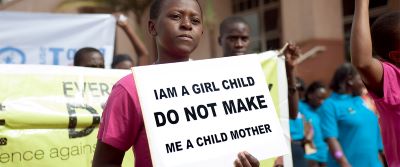
Hunger and Gender-Based Violence are Both on the Rise
There is mounting evidence that gender-based violence has increased since the onset of the global food crisis. Incidence of rape, intimate partner violence, child, early and forced marriage, sexual harassment, and sexual exploitation are reported to be on the rise. Strategies employed to cope with food insecurity are increasing girls’ and women’s exposure to violence both within their homes and outside them, risks that are furthered amplified in situations of conflict, insecurity, and displacement.
A recent study by CARE International highlights the disturbing correlation between hunger, gender inequality, and violence against women. According to Amy O’Toole, CARE’s Gender Justice Coordinator, “When hunger levels increase, so does the risk of gender-based violence.”
Gender Inequality Makes Women More Vulnerable to Violence
Gender-based violence is rooted in gender inequality, which reinforces unequal power relations between women and men, gender roles, and social norms that lead to the acceptance of violence. The constraints which affect food access for women and girls—including unequal control over resources, less autonomy in household decisions, and discriminatory norms which restrict their freedoms—also contribute to women’s and girls’ vulnerability to gender-based violence. This means the women and girls who are most at risk of going hungry are also more likely to experience violence. 1
Violence is on the Increase both Outside and Inside the Home
In Somalia, for example, reports from those displaced by drought indicate a 200% rise in gender-based violence (GBV) cases, particularly intimate partner violence and rape, compared to the same period in 2021. Access to food aid and the search for food and water heighten the risk of exposure to violence for women and girls when they are outside their homes, particularly in conflict and crisis settings. The risk of being sexually harassed, assaulted, or coerced into exchanging sex for food when out searching for food or going to emergency humanitarian food distributions can prevent women and girls from accessing food. Drought is forcing women and girls to walk longer distances – up to 30 km in some locations — to obtain basic resources including water, making them vulnerable to sexual and physical violence en route.2
When food is scarce, there is increased tension and conflict within households, resulting in more reports of violence in the home. Income insecurity, combined with exponential increases in the cost of basic necessities, puts tremendous stress on families, and can spark or heighten violence, particularly intimate partner violence (IPV). And when families are unable to meet their basic needs, they may adopt heart-breaking coping strategies such as marrying off their young daughters in exchange for money, food, or other assets, or simply to reduce the number of mouths to feed.

Child Marriage is on the Increase
According to a recent study by Plan International on the gendered impacts of the current global hunger crisis, new data from Ethiopia shows that child marriage has skyrocketed in that country by 51 per cent in just one year, as families resort to this desperate measure to alleviate financial pressure. Child marriage is a human rights violation with far-reaching effects for young girls. Child marriage threatens their lives, well-being and futures. As well as being far less likely to attend school, and more likely to experience teen pregnancy, girls marrying young increase their risk of experiencing other forms of gender-based violence throughout their lives. Globally, girls married before the age of 15 are almost 50% more likely to experience either physical or sexual intimate partner violence than those married after 18. Child marriage robs girls of their agency to make decisions about their lives, disrupting their education, making them more vulnerable to violence, discrimination and abuse, and preventing their full participation in economic, political and social spheres.3
Dig Deeper…
Dig into the two recent reports referenced in this Small Sip:
New CARE analysis highlights disturbing correlation between hunger and violence against women


